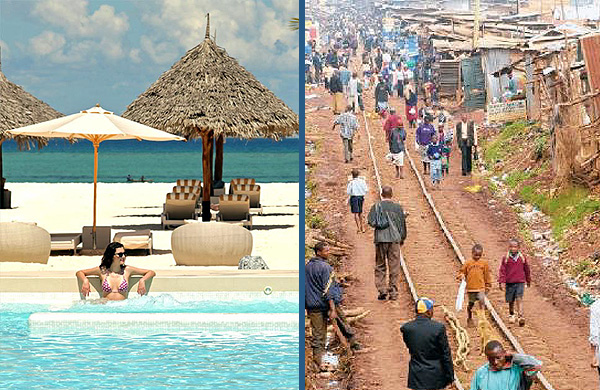 I can wallow under a giant rain shower or soak in a bathtub even larger than the 19th Century four-claw tub at my home.
I can wallow under a giant rain shower or soak in a bathtub even larger than the 19th Century four-claw tub at my home.
Our hotel housekeeper constantly refills our 4 2-liter bottles with purified water for more than just basic drinking needs, and plenty for our massive tea or coffee consumption. This is the Zanzibar Park Hyatt where each guest on average uses 30 times more water than the average Zanzibari.
EWT and other foreign guests wouldn’t come here were it otherwise. But it isn’t sustainable and many progressive Zanzibaris are growing increasingly vocal about it.
I have to interrupt this blog with my firm belief that individual tourists who choose to independently act in a more sustainable way is not only nonsensical but actually counter productive, so I’m not going to shame tourists.
“It all starts with YOU,” is a crazy idea. Remedies to Africa’s water shortages will be delayed or destroyed by promoting individual restraint. This is a macro, not a micro problem.
In the last ten years tourism in Zanzibar has doubled from around 150,000 visitors annually to last year’s 376,000. Only about a fifth of these (around 75,000) actually overnight in historic Stone Town, the vast majority coming strictly for a beach holiday on the opposite coast.
Charter flights especially from Europe and now a few from Asia arrive multiple times daily for beach vacations similar to an American’s to the Bahamas. Every level of holiday is available, from Air BnB’s to some of Africa’s most luxurious inclusive resorts.
This “tourism could ruin us all,” Prof. Mohammed Sheik of Zanzibar’s technical university told local journalists recently.
Tourism is 27% of the island’s GDP and provides more than 70,000 jobs, about a fifth of those employed here. But these percentages are down by more than half from a decade ago as Zanzibar develops other sources of income, just like Africa as a whole.
Tourism accentuates the income gap and as Africans grow more developed they understandably resent the differences.
Prof. Sheik suggests there’s an even bigger problem than available potable water: waste.
2200 cubic meters of raw sewage are dumped directly into the Indian ocean daily, according to Prof. Sheik. He argues that 80% of this comes from tourists.
These toxins, Sheik argues, have seriously contributed to the death of Zanzibar’s once pristine coral reefs and the resultant decline in much of the fresh fish commerce.
Tanzania like most sub-Saharan countries has banned plastic bags and efforts are underway to ban all disposable plastics as well. But Sheik says this is all just the tip of the iceberg.
Tourist waste is profound compared to any average Zanzibari. Not just water, sewage and plastics, but unused food, unneeded then discarded clothing and footwear, cosmetics, sunscreen, insect repellents, medications, paper and writing materials, even old phones are dumped on the island with all their internal toxins.
In a stunning rebuke to tourists in a country still heavily dependent upon it, the government of Tanzania issued a “Growth and Reduction of Poverty 2015-2020″ policy that insists any future tourism projects specifically show a value in reducing Tanzania’s poverty.
That may seem rhetorical but linking tourism to poverty reduction rather than growth parses a strategic line that does not bode well for tourism as it exists today.
The future of a world increasingly stressed by climate change and income inequality will not be one of increased tourism. For all of us who have loved and benefitted from tourism we must realize that decreasing income inequality and aggressively addressing climate change now come first.